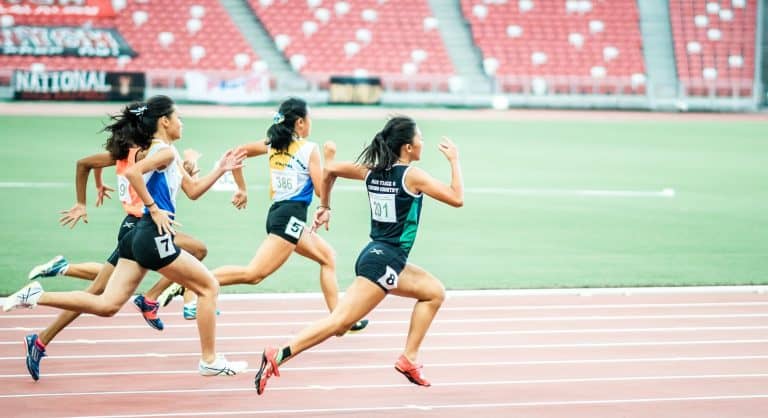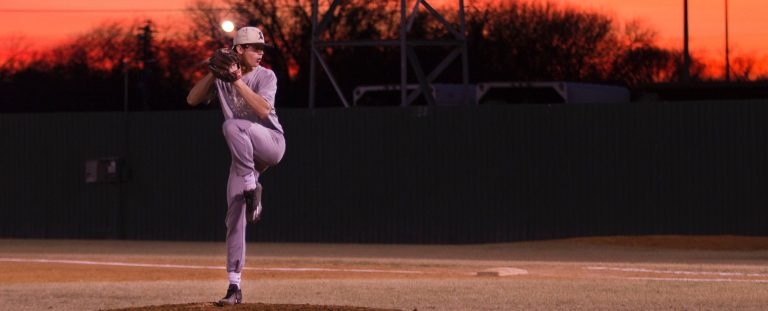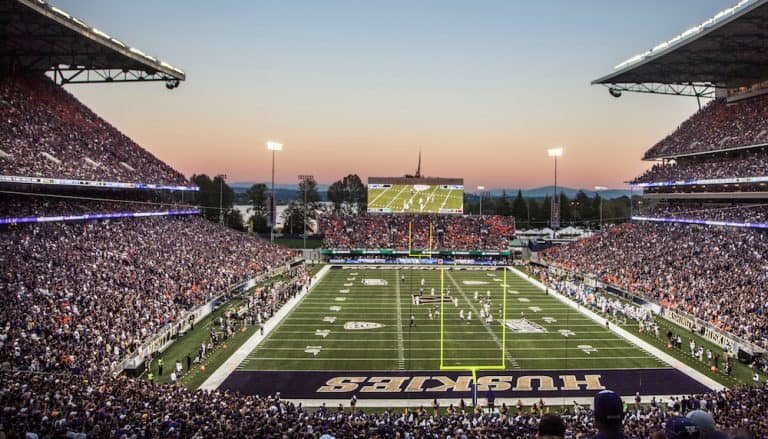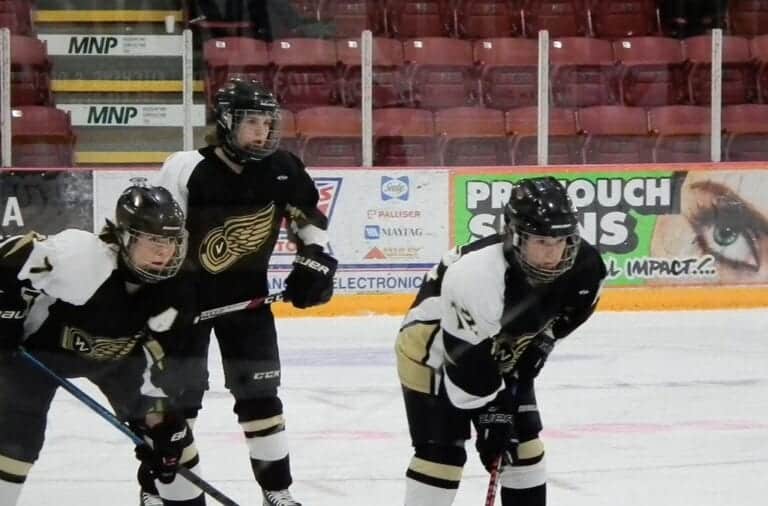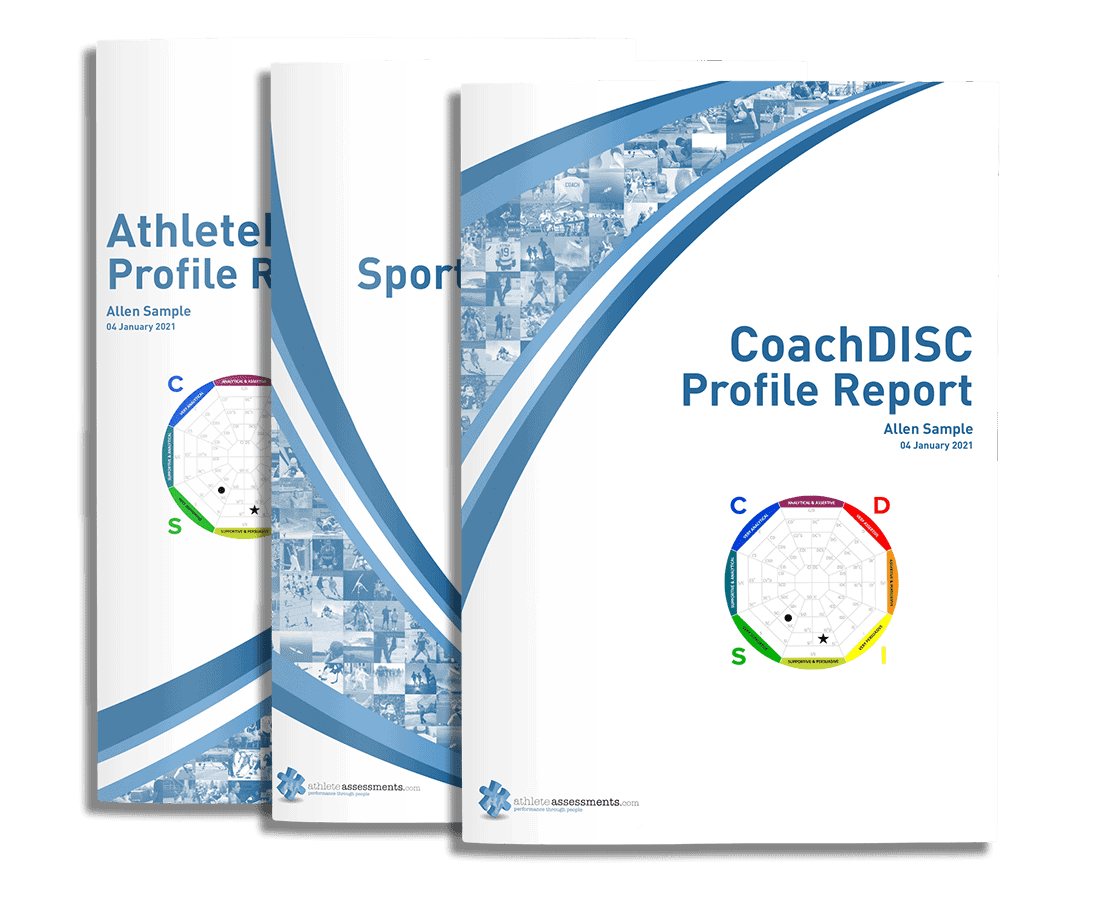When a university program effectively creates value during every step of a student-athlete’s journey, it ensures they not only have a successful university experience, but it also sets them up for life beyond sport. While during their college career, it can help athletes improve interactions with teammates, coaches, and staff, as well as their ability to compete, in the transition to professional life and life beyond the sporting arena. Ultimately it provides them with the tools they need to transfer the skills developed competing at an elite level to whatever comes next.
So, how do the best programs ensure their student-athletes connect with the development opportunities on offer?
To uncover the core principles behind why some programs are so effective, we took a deep-dive into the University of Washington’s Student-athlete Development Program – Boundless Futures, and spoke to some of the key players involved in its success; Amy Wooten, former Assistant Director of Student-Athlete Development at University of Washington*; and Sonny Badaluco, current Assistant Director of Student-Athlete Development.
While Amy is no longer at the university, the positive impact of her initiatives remain, so we wanted to highlight and share her pivotal involvement in the program’s creation. Meanwhile, Sonny continues to lead and carry on the renowned program since joining UW in 2022, sharing exciting insights into the future of the ever evolving program.
Across the board, UW Athletics utilizes Athlete Assessments’ DISC Profiles as a foundational component to holistically address individual and team development through the Boundless Futures program. Each of the 650 student-athletes, their coaches, and the administration team undertake DISC to uncover ways they can improve communication while maximizing relationships to drive results. To recap, DISC is a behavioral development tool which is primarily designed to build self-awareness and provide a framework for better understanding others in any given environment. Athlete Assessments’ DISC Profiles are the world’s first and only developed specifically for sport, and the team at UW take advantage of the full suite on offer, using the AthleteDISC, CoachDISC, and Sport ManagerDISC.
Taking us behind their reasoning for using DISC athletics-wide, Amy shared they were determined to take the tool beyond conventional development and effectively reinforce their messaging to student-athletes. She added,
“The department really integrated DISC, almost like a second language. We like to tease that if you’re standing in line, or waiting for an elevator, you’re probably looking for something better to talk about than the weather. Now no matter your relation, you can ask the person next to you, ‘Hey, what’s your DISC profile?’”
While Amy has made her own career transition out of the sporting world, the Student-athlete Development team at UW continue to utilize Athlete Assessments’ DISC Profiles in their programs and throughout the university. UW’s programs are known for producing evolved graduates, well equipped for the challenges of high-performance sport and professional life and as Sonny shared,
“Our teams do a great job of taking advantage of DISC because they understand the value of it. As a department we will continue to find ways to keep integrating it in our educational strategies.”
At UW there are 22 varsity sports, each with their own culture, language, and series of goals, and while each student-athlete’s identity is linked to their sport, the teams share many commonalities which are harnessed in the university’s leadership workshops and development programs. Working with student-athletes in their regular day-to-day life, at orientation, on a one-on-one basis, and in a team capacity, the Student-athlete Development Team strives to help the athletes better understand who they are so they can perform at their best, on and off the sporting field.
When a student-athlete starts their college journey with UW, one of the first things they do is complete their AthleteDISC Profile. The profile produces an individualized 40-page report that provides each student-athlete with an awareness of their personal processes, the behaviors they prefer, the pace they are most comfortable with, their communication tendencies, and how they build relationships with others. Importantly, the profile also highlights the individual’s unique strengths, the environments they perform best in, and how they can best contribute to a group.
Sonny shared,
“Student-athletes are always excited to see the results of their assessments, I think it’s part of that competitive nature and drive for constant improvements. Personally, I always enjoy seeing them read their results for the first time and share it with their teammates, hearing things like ‘That is so you!’ or ‘That makes total sense for you!'”
The process of sharing profiles between teammates and coaches creates invaluable connections and unlocks understanding, enabling team dynamics to grow, and the Student-athlete Development Team prioritize this. When the team first reviews a student-athlete’s individual results, they get them talking about their profile out loud to start practicing conversations around what stands out to them in their profiles, or things that they think are important for their teammates and coaches to know.
“We talk about, ‘Why did you have to focus on that?’, ‘Was it a little bit hard?’, ‘How is it stretching you?’ Then I explain that we’re trying to get the same outcome, we’re just approaching it a little differently.”
The team also use experiential learning to consolidate the student-athletes’ understanding of DISC and the skills that will progress their development as people. Amy shared one of her favorite activities where she asks athletes to write their name with their preferred writing hand, before then repeating the task using their non-preferred writing hand. She then asks the students to compare the two. The activity is designed to demonstrate how it feels to flex your communication, at first it might not feel natural and may take a little more focus to get a desired result, but with practice you become more comfortable with it.
When the student-athletes write with their dominant hand, they do not have to think about it, but when asked to make a significant adaptation to use their non-dominant, it requires more effort and concentration to achieve the outcome. While it is rare to ask people to make such a big change for an immediate outcome when using DISC, instead we’re usually finessing the way we already do things. Amy uses this activity to build a bridge between the concept and the skill that student-athletes need to build into their repertoire of behaviors to get the most out of their interactions with others.
Amy noted,
“One thing I think we can help student-athletes do, is realize how much potential they have. I think personal, professional, and leadership development is critical for any student, and it is critical for our student-athletes.”
Team interaction is a specific area of development also included in the Boundless Futures Program and the development team use DISC to help student-athletes determine effective outcomes for a variety of situations. For example, they might be having communication hitches with teammates, or they are looking to fill a gap and step into a leadership role but haven’t yet been identified as a leader, or they might be a captain having a hard time collectively leading their team.
The process first looks at self-awareness in the individual student-athlete, before then building on each student-athletes’ DISC Profile by diving into team-awareness to create a deeper understanding of the dynamics and culture within the team.
Amy shared an example of how they apply the learnings from DISC and translate it into meaningful contexts for the athletes,
“We use activities that allow us practice flexing communication, like creating mock text messages and team environments for each style, or saying to our student-athletes, ‘Hey, your teammate has a question, how would you answer based on their primary style?’.”
The UW Student-athlete Development Team dedicate specific sessions to transferring the skills student-athletes learn on the sporting field to non-competitive environments, sometimes it’s as simple as circling certain entries in a list of skills, or as open as talking about specific strategies that student-athletes can use to improve communication with team members or coaching staff.
Additionally, the team also help student-athletes learn how to transfer their skills learnt as high-performance athlete and prepare them for professional life through individual ‘career conversations’. Amy reflected on this approach sharing,
“When I worked one-on-one with student-athletes we would talk about their strengths or environments they work well in from a career perspective. We’d look at how we can use this in interviews, on a resume, when talking to mentors, or trying to set goals for ourselves.”
“DISC is a fantastic vehicle for student-athletes because it helps them articulate why they are a good fit for any organization. DISC actually shows them, ‘Hey, here’s all of the reasons why you’re such a hireable person, or why this company culture fits with exactly the environment you thrive in and what your strengths are’. From a career preparation standpoint, it empowers them to talk about what they’re good at.”
Sonny added,
“One of the things we always instill into our freshman student-athletes when taking the assessment, is that they won’t be the same person in two or four years, so we want them to continuously revisit DISC to learn more about how they have grown over that time.”
Part of what makes UW’s Student-athlete Development Program so effective, is the way the team connect with their athletes. Amy provided the example of when students with each of the four different styles would come to her office. She explained that when she had a student high in Conscientious ‘C’ coming to see her about something unrelated to DISC, ahead of time she will send them everything they need for the meeting, knowing this will make them feel more comfortable and prepared. If the student was high in Influence ‘I’, the first thing she will ask them is, “Hey, how have you been?” or “How is your family?” making time to catch up first. If the student was high in Dominance ‘D’, Amy would immediately outline what they are going to accomplish in the session and the take-homes, ensuring to be direct in her communication. Finally, if the student was high in Steadiness ‘S,’ Amy would take a similar approach as a ‘C,’ taking the time to explain the details while encouraging the individual to share their thoughts.
Development of any type, whether personal or professional, is a continual process. The learnings of today become the building blocks of tomorrow’s knowledge if the correct development tools are applied. Preparing for performance through practice and applications in low-stake environments, ensure our student-athletes develop and apply the skills they learn theoretically. To conclude, Sonny shared,
“On the individual and team side, I most often see DISC helping with communication. Whether you’re a coach or athlete, everyone communicates differently. Using DISC as a baseline to better understand how to approach different conversations with different people can be a great way to just get a conversation started, and sometimes that’s half the battle.
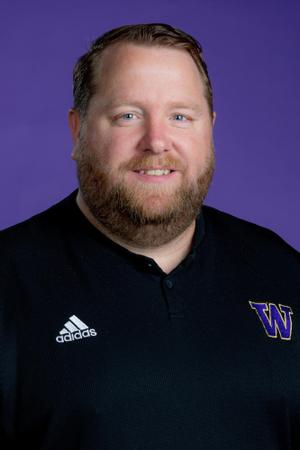
Biography for Sonny Badaluco
Sonny Badaluco serves as the Assistant Director of Student-Athlete Development at the University of Washington. In his position, Sonny leads and directs all educational initiatives through UW’s Student-athlete Development Program – Boundless Futures, a holistic program designed specifically for student-athletes to help them excel in every facet of their lives. Sonny graduated from National University with a Bachelors in Sociology and later from the University of Washington where he received his Master of Education in Intercollegiate Athletic Leadership. Previously, Sonny served as a Leadership and Finance instructor at Colusa High School in Northern California where he coached Football and Baseball for 15 years.
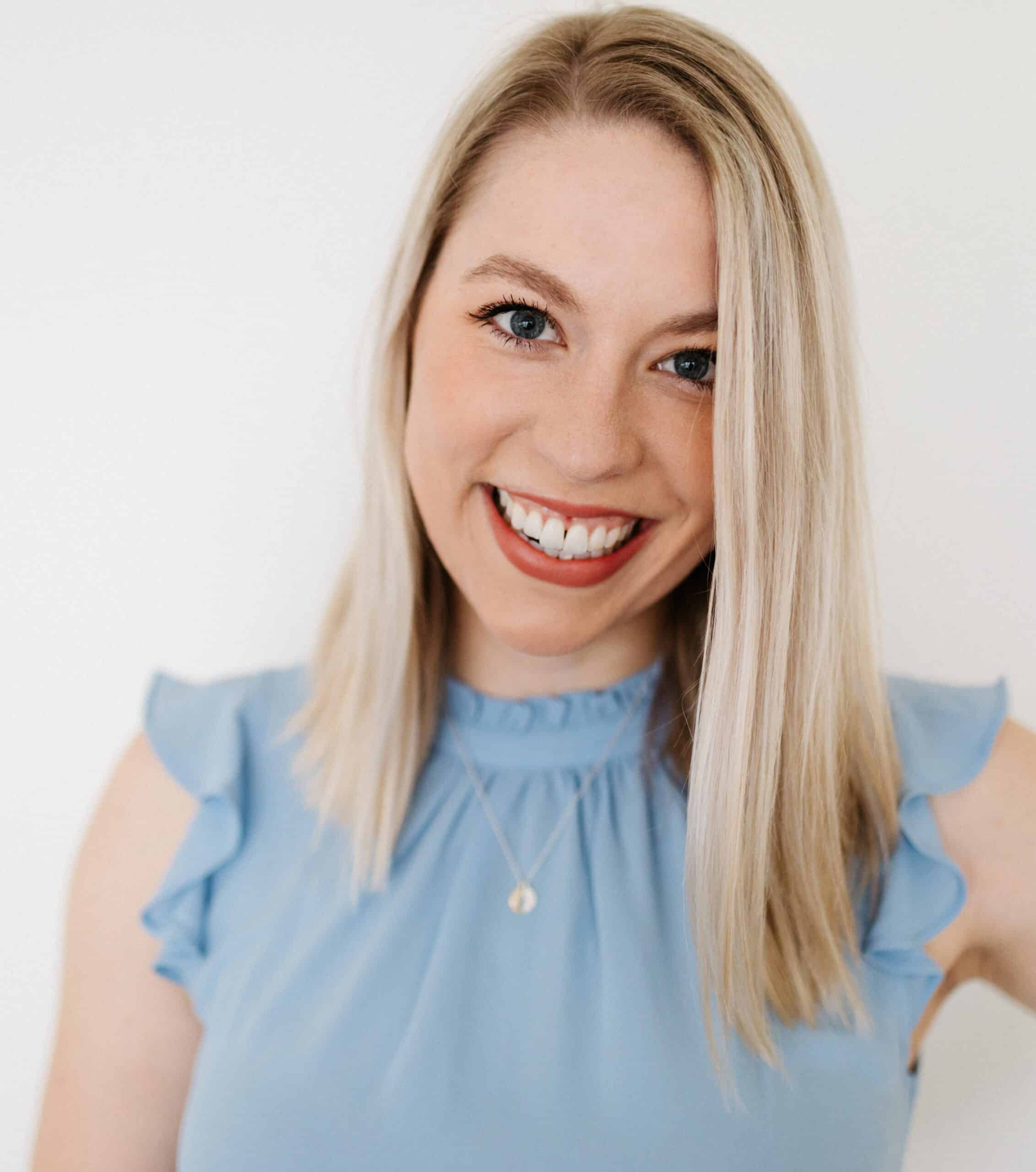
Biography for Amy Wooten
*In her new role as Program Director for Cancer Pathways, Amy manages all aspects of the organization’s programs and activities. Amy graduated from Pacific Lutheran University with a Bachelor’s in Communications and later from the University of Washington where she received her Masters in Education. In her previous role as Assistant Director of Student-Athlete Development at University of Washington, Amy directed educational programs to support student-athletes beyond the classroom and their sport, setting them up for future career success. With over five years of experience in program development and management, Amy is passionate about identifying compelling ways to educate, connect, and empower the people she works with.
Where to from here?
If like the UW Student-athlete Development Team, you are working with people to develop and hone their skills so they can be the best version of themselves, we encourage you to learn more about our suite of sport-specific DISC Profiles and contact us to discuss how we can tailor our approach to get the best performance out of your people.
Recommended Articles
What are the critical factors that makes an athlete’s transition at the end of their sporting career a positive one? We asked the experts, those who have been through it, seen others do it, or helped others through it.
Bob Tewksbury, Mental Performance Coach and baseball legend, on why the most successful athletes are those who can be adaptable in their behavior and how he develops this ability in his clients.
The benefits of a strong and effective coach-athlete relationship has had the spotlight for some time now due to the intrinsic and positive links it has on performance. What’s interesting is coach-administrator relationships have come under increased scrutiny as research highlights poor athlete outcomes across the spectrum of collegiate and professional sports when these relationships breakdown. However, we’ve now seen that addressing this divide at the educational level is producing results in the real world. So, we spoke to Sara Lopez, Ph.D., Teaching Professor of the University of Washington’s unique Intercollegiate Athletic Leadership Master of Education about how.
Coaching and successfully developing elite athletes requires dedicated attention to mental skills development – self-awareness, self-belief, identity and resiliency, skills which benefit athletes in competition and in life. Kyle McDonald, Mental Performance Coach, General Manager and Performance Director of the Weyburn Gold Wings, shares the process of mental skills development


